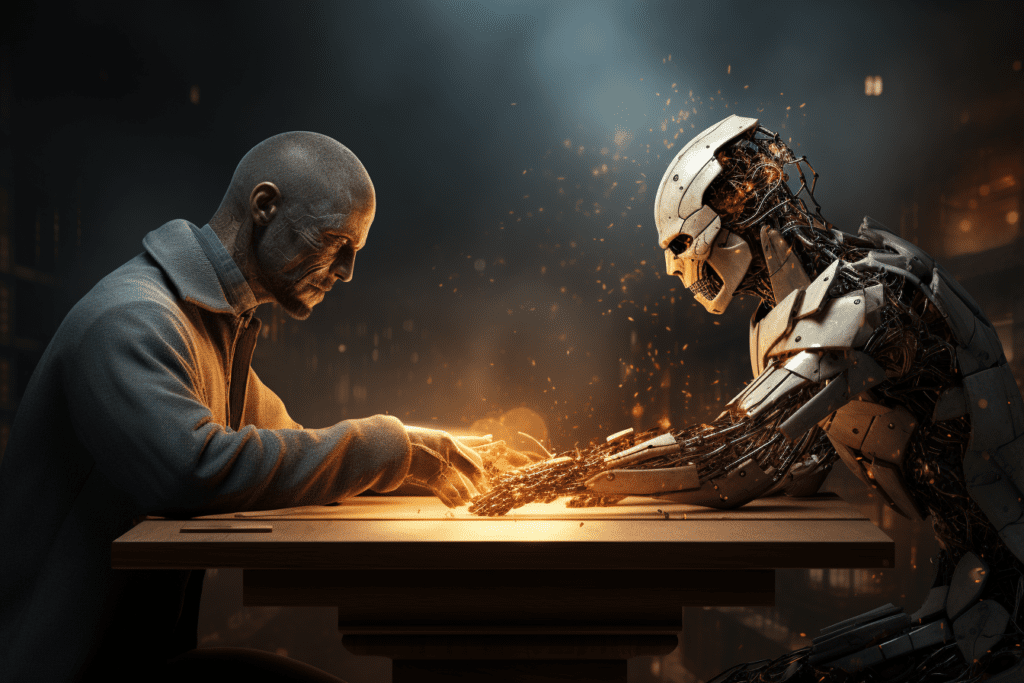AI vs Human Writers: Who Wins the Content Battle?
Who will win the content battle between AI vs Human Writers? Let’s investigate! What are the pros and cons of each? Who can create the best quality, engaging content? Let’s find out!
AI writing quality
AI has the capacity to craft top-quality content, rivaling humans’ writing. Its NLP features allow it to form sensible, consistent and accurate text. Here’s a table comparing AI writing:
| Criteria | AI Writing Quality |
|---|---|
| Grammar | Excellent |
| Coherence | Remarkable |
| Structure | Well-organized |
| Creativity | Limited |
AI is great at grammar and structure, always producing text that meets the highest standards. However, it can’t come up with original ideas or add personal experiences. It also can’t match the depth of research and unique views human writers bring.
Tip: Use AI for generating structured content quickly and in bulk. Then add human expertise to inject creativity and uniqueness.
It looks like it’s time to get ready for the contest between AI and human writers – who will create better content?

AI vs Human Writers
When it comes to human vs machine writing, several factors come into play. Humans possess creative ability and depth, while machines excel in precision and speed. Human writing can interpret complex emotions, while machines are great for factual info.
Collaboration is key. Tasks requiring creativity should be assigned to humans, and machines used for data analysis. Human writers should also keep learning, to stay relevant. Establish effective feedback mechanisms, so both humans and machines can learn and improve.
By striking a balance between human potential and machine efficiency, high-quality content can be generated. This competition can be turned into collaboration, harnessing the best of both worlds. AI may be able to generate content, but can it endure all-nighters like human writers?
Can AI replace writers?
The potential for Artificial Intelligence (AI) to transform content creation is huge. AI systems can process huge amounts of data and learn from it, allowing them to create well-structured, engaging pieces in seconds. AI tools can also help with grammar, readability, and suggesting ideas.
But AI lacks the emotional intelligence humans possess. Human writers can convey emotions through words, connecting with readers on a personal level. They also have creative abilities that AI may struggle with.
A hybrid approach could be beneficial – AI tools to generate initial drafts and do research, while human writers refine and inject creativity. Combining these two forces could create a powerful synergy, with AI improving accuracy and efficiency, and humans adding depth, authenticity, and emotion.
Frequently Asked Questions
FAQ:
1. What is AI content writing?
AI content writing refers to the use of artificial intelligence technology to generate written content. AI algorithms analyze data and patterns to produce human-like text in various formats, such as articles, blog posts, or product descriptions.
2. How does AI compare to human writers?
AI has advantages in terms of speed, scalability, and cost-effectiveness. It can generate content quickly, handle large volumes of work, and doesn’t require payment or breaks. However, human writers bring creativity, empathy, and a deeper understanding of nuanced topics, which AI still struggles to replicate.
3. Can AI replace human writers entirely?
No, AI cannot replace human writers entirely. While AI can automate routine content creation tasks, it lacks the critical thinking, emotional intelligence, and ability to adapt that humans possess. Human writers can offer unique perspectives, creativity, and originality that AI struggles to match.
4. What are the limitations of AI content writing?
AI content writing can produce generic and repetitive content. It may lack the ability to deeply understand complex topics or adapt to evolving trends. Additionally, AI-generated content might lack an authentic human touch, making it less engaging for readers.
5. How can AI and human writers work together?
AI and human writers can complement each other in content creation. AI can assist human writers by generating drafts or aiding in research, leaving the creative aspects to the humans. Together, they can leverage AI’s efficiency and humans’ unique abilities to deliver high-quality content.
6. Which is better: AI or human writers?
Both AI and human writers have their strengths and weaknesses. AI is superior in speed and scalability, making it ideal for high-volume tasks. Human writers excel in creativity, critical thinking, and forging genuine connections with the audience. Ultimately, the choice depends on the specific requirements and goals of the content project.
Sources
Washing Post: Opinion Type in your job to see how much AI will affect it
Forbes: Artificial Intelligence Jobs: How Will AI Change The Job Market?